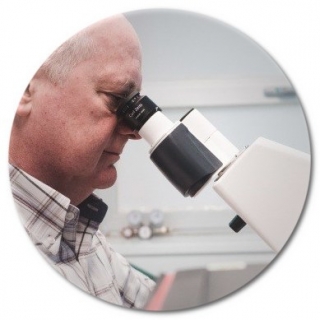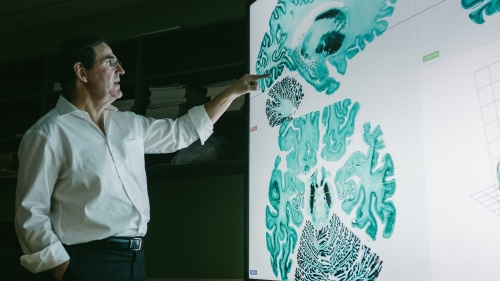 Understand the potential of the human brain and the entire nervous system
Understand the potential of the human brain and the entire nervous system
McGill is one of the world’s leading centres for research and education in the neurosciences and related fields. Our researchers cover a tremendous range of study, from the genetic, molecular, and cellular foundations of the nervous system to the networks supporting complex behaviours, including pleasure, emotions, decision-making, and language.
This range, which spans Faculties, sites and themes, makes McGill uniquely positioned to advance knowledge in cognitive neuroscience and brain plasticity across the life course, models of neurodegenerative disease, population neuroscience, and neuroinformatics and computational modeling – all aimed at the understanding of the human brain and the prevention and treatment of mental and neurological disorders.
Our researchers are driven by questions, such as: “Which factors are associated with mental health, and how are mental and physical health connected?”, “How do we ease the burdens of individuals and families whose lives are affected by neurodegenerative disorders?” and “How can we develop new approaches for deciphering, applying and sharing the enormous amounts of data we can now collect on the brain and nervous system?”
Image: Dr. Guy Rouleau looks into a microscope. (Alex Tran)
Healthy Brains for Healthy Lives (HBHL) is a high priority, multidisciplinary and cross-sectoral initiative funded primarily by the Canada First Research Excellence Fund (CFREF). HBHL is devoted to reducing the human and socio-economic burden of psychiatric and neurological illnesses. The program aims to transform many brain disorders from terminal or life-long afflictions into those that are treatable, or even curable. HBHL brings together world-leading researchers in genetics, epigenetics, neurophysiology, imaging, behavioural, social and environmental determinants to understand the individual brain in health and disease. Using the latest neuroinformatics and big data analytics, we can now distill vast amounts of raw data into unprecedented insight into brain development and function. Findings from HBHL will contribute to the development of a Canadian Framework for Brain Health – a suite of evidence-based best practices, guidelines and policies for improved patient care.
Image: Dr. Alan Evans looking at a brain scan. (Alex Tran)
Examples of Research Areas
Neurodegenerative Disease
Neurodegenerative diseases such as Alzheimer’s disease, Parkinson’s disease, amyotrophic lateral sclerosis, and vascular cognitive impairment have devastating effects on individuals and their families, many of whom are also caregivers. The symptoms of these disorders vary, but they are all marked by a gradual decline in cognitive abilities and memory resulting from a progressive loss of brain cells or brain cell function. As our population ages, the number of people affected and the cost of treatment is expected to rise dramatically. Researchers at McGill are world leaders in the investigation of the biological mechanisms behind these disorders and in the development of new precision therapies to eradicate or at least slow down their effects.
Mental Health
How the brain codes emotions and behaviours are among the ultimate frontiers of modern medicine. Over the last 40 years, we have seen significant changes in the understanding of mental illness, which to a large degree comes from advances in neurosciences and increased acceptance in psychiatry that psychiatric illness results from disturbances of brain function. Researchers at McGill are investigating disorders that start during the first two decades of life, such as schizophrenia, eating disorders, mood disorders, and suicidal behaviour. McGill has been an international leader in the investigation of mechanisms that help explain the impact of early-life experience on the risk of developing these disorders or other psychopathologies in general.
Pain
A prevalent and economically burdensome human health problem, and the continuing challenges of treating chronic pain underlie the opioid crisis in North America. McGill researchers are working on the development of novel, non-addictive analgesics to provide new options for the treatment of people in pain. Ongoing efforts range from the elucidation of the brain and spinal cord circuits sub-serving chronic pain, to the development of new ways of measuring pain in animal models, to performing clinical trials of promising new treatments.
